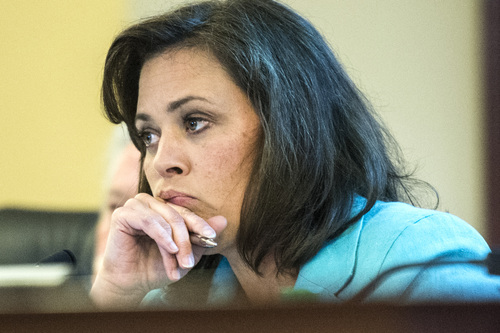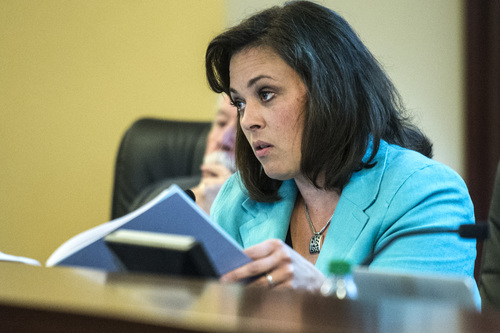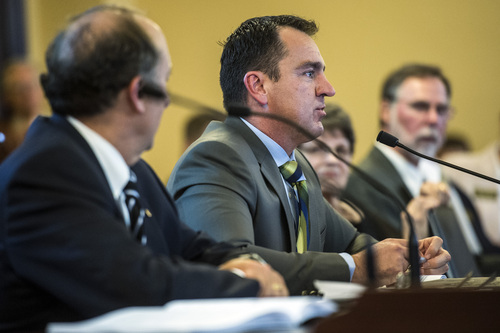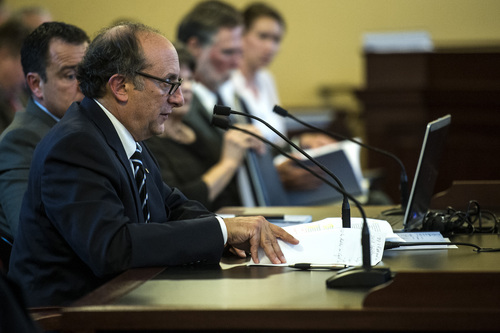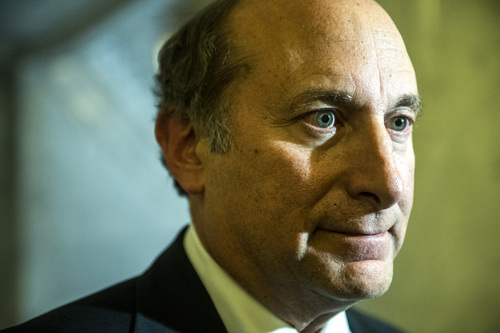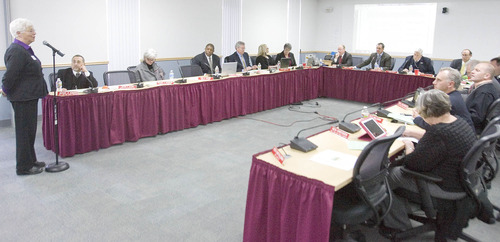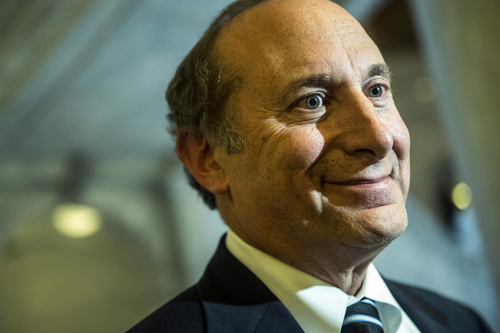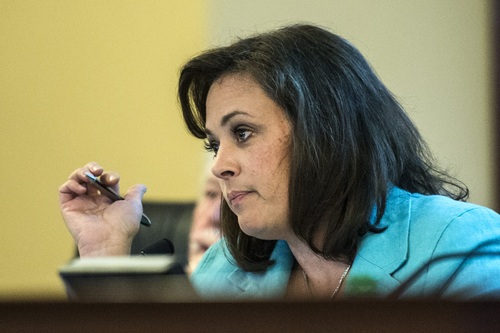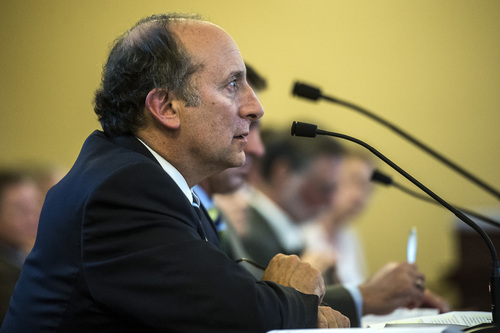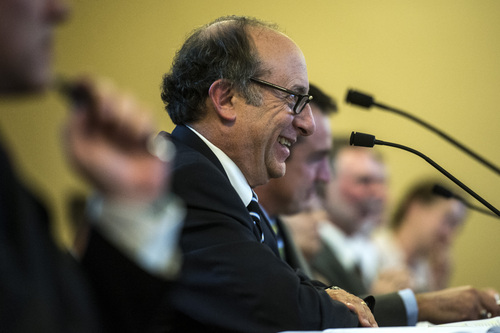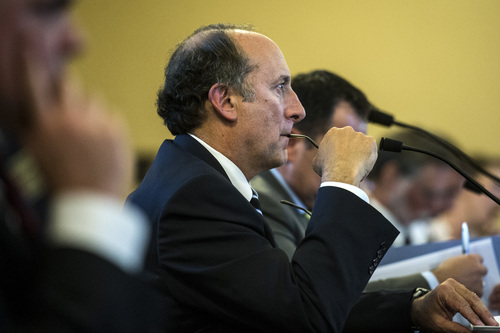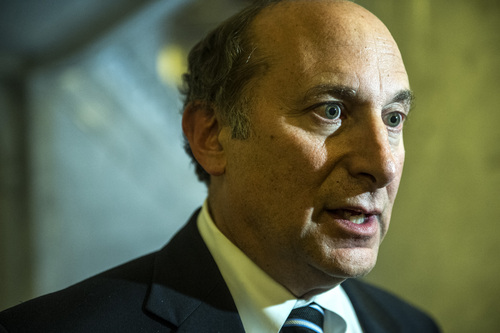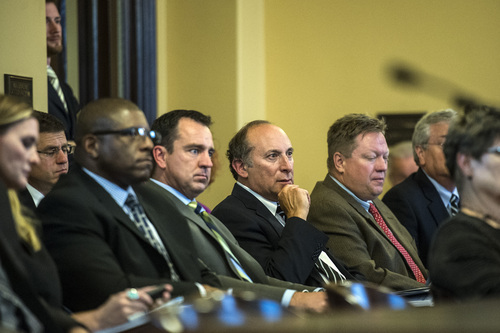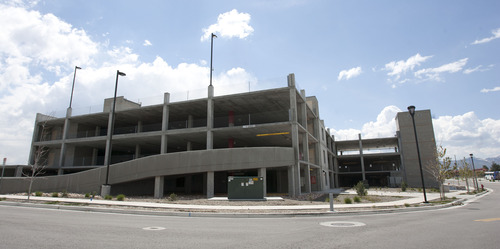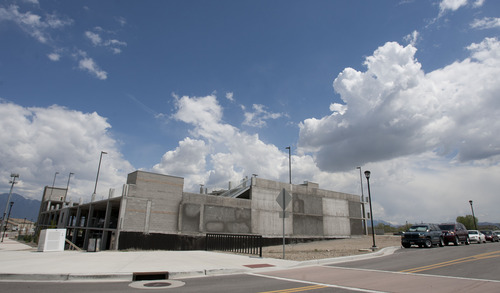This is an archived article that was published on sltrib.com in 2014, and information in the article may be outdated. It is provided only for personal research purposes and may not be reprinted.
The Utah Transit Authority "prepaid" a developer $10 million to construct a parking garage — which it turns out he never built — just after he made a multimillion-dollar deal benefiting a UTA board member. The agency never got all the money back from that advance.
The troublesome incident is one of many described in a blistering, yearlong legislative audit into UTA operations that was released Tuesday.
It complains about other sweetheart deals, extravagant pay and bonuses, failure to plan well for $2.9 billion in maintenance costs from new rail projects, a fare structure that may force the poor to subsidize the rich, and massivedebt that might prevent restoring bus service that was cut to fund new train lines.
The UTA takes issue with the audit and issued a 50-page response. It says questionable developer deals actually made UTA money, that executives (with up to $400,000 annual compensation) are paid less than at similar agencies, and that UTA is run well and was recognized for its achievements in a recent award as the nation's best transit agency.
State auditors, meanwhile, complain that UTA changed explanations and delayed producing data — a pattern they say "leaves us doubtful about whether we have obtained full and complete information. In some instances, we are uncertain what to believe."
Sen. John Valentine, R-Orem, who requested the audit and is retiring to head the Utah Tax Commission, says it confirms allegations of shady deals and other concerns that critics brought to him.
"I had some inside people come to me and say, 'We don't think things are right here.' " After reading the audit, he adds that "the information that was given to me was accurate."
The scathing audit findings could kill ongoing efforts to raise sales tax for transit, Valentine says. "If the voters understand there are problems with the use of present tax dollars, as shown by the audit, I think they are going to be reticent to allow additional tax dollars until things get cleaned up."
—
Sweet deal • The audit raises red flags about two UTA "transit-oriented developments" with companies run by Jeffrey Vitek. It says UTA essentially acted as Vitek's banker by providing a huge advance in one deal and, in another, may have awarded him a bid unfairly and then granted him a too-generous contract.
These deals came just after Vitek bought the development rights on land near the Draper FrontRunner station from Terry Diehl, who at the time was a senior member of UTA's board. A 2010 legislative audit said Diehl may have violated state law by using inside information to obtain the Draper development rights. He later was pushed to resign from the UTA board, but not before being given a waiver from its regular one-year ban on former board members doing business with UTA.
When Diehl sold his development rights to Vitek, according to earlier audit notes, Diehl made "millions." Auditors didn't put an exact estimate on the amount except to say it was "less than $24 million." Diehl has said most of the money was to reimburse his costs and that he "made very little" profit.
Diehl and Vitek did not return phone calls Monday and Tuesday.
The newly released audit says that in December 2009, the same month Vitek bought development rights from Diehl, UTA "prepaid" $10 million to a company Vitek runs to build a parking garage at the Draper FrontRunner station "even though there were no design specifications or immediate plans for construction."
A couple of years later, "UTA hired another contractor to build the garage, but the developer no longer had all the funds immediately available to repay UTA. UTA is still owed $1.7 million."
While UTA officials claim the publicly funded organization actually realized a $12.5 million return on the deal over the years, auditors dispute that.
"UTA appears to be acting as a banker for the developer," auditors say.
They add that the agency offered various reasons over time why it had not sought full repayment of the advance to Vitek. UTA's official audit response says such collection efforts could have delayed the FrontRunner station for years amid legal wrangling over land used as collateral in the deal.
Auditors say the land beneath the parking structure "was not listed on UTA's official property assets list prepared and presented to the [UTA] board. This omission raises questions about the sufficiency of information presented to the UTA board."
Valentine says the newly revealed details of the deal cause him heartburn. "It looks like there is some kind of insider trading going on."
Senate Minority Leader Gene Davis, D-Salt Lake City, a member of the legislative audit subcommittee that received the report said he thinks UTA should not be in the development business on its land.
"You're not a developer. You're the mover of people from point A to point B. We've got to get to that point in the state," he said.
—
Sweet Deal II • The month after Vitek received the $10 million prepayment for the Draper garage, UTA selected another company run by Vitek as the developer for a residential-commercial project on UTA land at the Jordan Valley TRAX station, according to the audit.
The award was made even though Vitek did not provide the agency required information about his company's finances, in contrast to two other bidders. Despite some staff complaints documented in emails to higher-ups, management approved the deal.
UTA told auditors that West Jordan drove that decision "even though only two of the nine individuals scoring the proposal were from the city."
An outside law firm hired by auditors to review the agreement concluded it "unduly favored the developer" and was "far out of market." The legal analysis says UTA seemed to be"acting more as a funding source than a partner" and noted wording in the contract creates "uncertainty and ambiguities that could be used against UTA" if the development never makes the money envisioned.
In all, $26 million in local and federal funds were spent to build two large garages and other facilities at the West Jordan site to help the planned transit-oriented development. Meanwhile, auditors say, the developer has not yet paid its $3.9 million share of the cost for the pair of 598-stall structures, which two years after completion continue to sit mostly empty.
"Had UTA not built the parking structures and upgraded other infrastructure needed for the TOD [transit-oriented development], the cost of the Jordan Valley site would have been significantly less," the audit says.
"These transit-oriented developments are something that UTA does not have much experience with. So they are making some mistakes," Valentine says. "I can't think of anyone in the private sector that would give a $10 million advance."
UTA says it has made all changes recommended by auditors to improve oversight of transit-oriented developments.
—
High pay • The audit says UTA executives receive much higher compensation than at similar agencies, use unfair comparisons to justify it and failed to report all benefits on the state's transparency website.
For example, it says UTA's top nine executives were paid 49 percent more than the top nine highest-paid employees at the Utah Department of Transportation — and UTA bonuses were six times larger.
UTA General Manager Mike Allegra's 2013 compensation was $402,187, including a $30,000 bonus, the audit says. UDOT Executive Director Carlos Braceras received $221,433 and no bonus.
Allegra's compensation is 15 percent higher than the director of the Salt Lake City International Airport. The next two highest-paid UTA employees are paid 83 percent more than the two corresponding officials at the airport.
The audit says it intended to compare compensation to other transit agencies, but did not because UTA persuaded it that other agencies had not provided much data beyond base salaries.
In its response, UTA says Allegra's salary is below average for directors of comparable transit agencies, spurring auditors to note those comparisons don't take into account full compensation, including benefits. The agency adds that it is restructuring its bonus program in a way that will lower them for many executives.
The audit also points to perks given to top UTA executives, including car allowances (Allegra receives $12,240 annually) and match-free payments of up to $23,500 each into retirement plans. Rank-and-file employees, meanwhile, pay $3 for every $2 matched by UTA.
Additionally, the audit says Allegra and UTA General Counsel Bruce Jones have special insurance policies not available to others. Jones also is allowed to earn double service credits toward a pension for his first 10 years of service. After 10 years, the pension would be worth $100,000 a year instead of $50,000.
Valentine, an attorney, says Jones' total compensation of $384,472 — including $222,835 in salary — is high in this market for "any general counsel, especially for a government agency. To put it in perspective, it [the base salary] is over twice what my compensation will be as chairman of the tax commission."
As The Salt Lake Tribune previously reported, UTA failed to report to the state's transparency website about 15 percent of employees' total compensation from benefits, but has since mostly fixed that.
However, auditors say they warned UTA "several months prior to" its submission of 2013 data, but the agency chose not to include all data anyway, saying its lawyers advised that was unnecessary.
Now-updated data on the transparency website still do not match audited amounts for some officials. UTA data on the website list Allegra's compensation, for example, at $397,900 — while the audit puts it at $402,107.
UTA spokesman Remi Barron says UTA's figures reflect actual dollars rather than an actuarial rate used by auditors. Nevertheless, UTA plans to match auditors' methods next year, Barron says.
—
Financial problems • Auditors also outline several financial problems that could hurt long-term UTA operations.
Because of borrowing for new rail lines, the audit says 50 percent of UTA sales taxes now go just for debt payments. By 2018, it will be 60 percent before debt starts to decline as bonds are retired.
The audit says UTA has been dipping into reserves rapidly "to cover ongoing and capital expenses." It adds, "UTA has little margin for error if sales tax revenues do not meet expectations."
Only recently, UTA identified $2.9 billion in expected costs to maintain new rail systems through 2033, the audit says. "UTA has not yet worked much of these costs in its long-term planning documents and needs to identify future funding sources," and that needs to be covered before building more projects.
"Bus service has suffered because of the financial constraints," the audit adds. Bus revenue miles decreased by 8 percent between 2009 and 2013, in part to help pay for new rail service — where revenue miles increased by 109 percent.
UTA responded that it has sufficient money to operate and maintain its existing system, but that new projects will require new funding.
The audit notes that some lawmakers point to the need for more bus service to push legislation to raise caps on sales tax for transit, and allow local elections on raising taxes.
House Transportation Committee Chairman Johnny Anderson, R-Taylorsville, unsuccessfully ran such a bill earlier this year. He says the audit could hurt its future chances — especially among voters.
"That's going to be a tough sale," he says.
Claire Geddes, a longtime activist critic of UTA, says the audit appears to confirm many of her concerns. "The audit shows UTA is basically going the wrong direction in providing more bus service, but is full-speed ahead with high pay."
—
Fairness • Auditors question whether UTA's fare structure forces the poor to subsidize the rich.
It says the FrontRunner commuter rail receives a 95-percent subsidy from sales tax, while buses receive an 85-percent subsidy.
"The majority of FrontRunner riders earn more than $50,000 per year, whereas the majority of bus riders earn less than $25,000 per year," the audit says.
A big discrepancy also exists between people who have discounts through employers or schools, and those who pay full fare or passes without discounts.
"The average fare per boarding for a public pay rider was $1.70, well above that of a pass program rider at $0.66," the audit says. The regular cash fare is $2.50.
UTA responds that its fares "have helped the organization achieve its highest ridership ever, over 44.2 million trips, and increase farebox revenue."
The agency is conducting a new fare-policy analysis "to better structure fares in order to maximize ridership." That review includes studying charging distance-based fares, instead of the current flat rate.
Twitter: @leehdavidson —
UTA Board meeting
The UTA Board will hold its monthly meeting Wednesday at 2:30 p.m. at the agency's headquarters, 669 W. 200 South, Salt Lake City. A group is scheduled to present a petition with more than 3,000 signatures seeking more late-night service.


